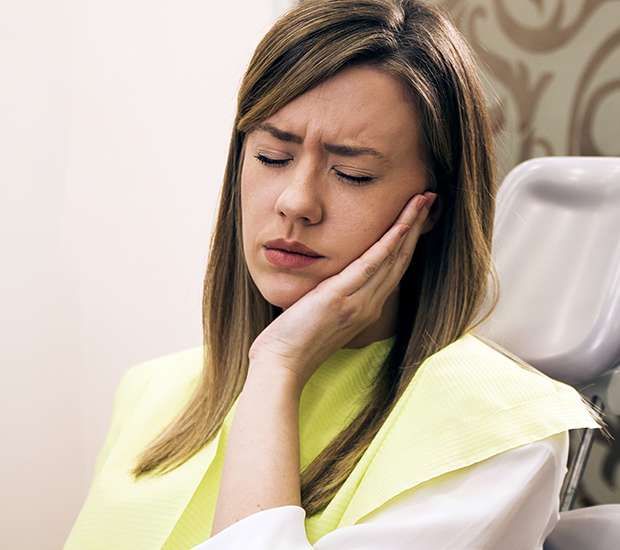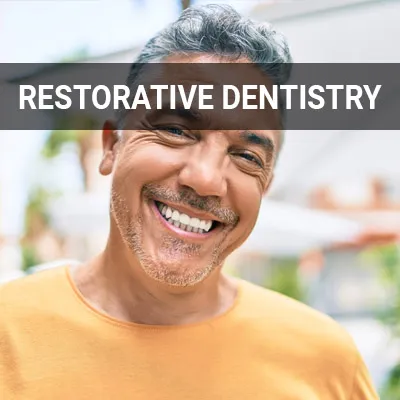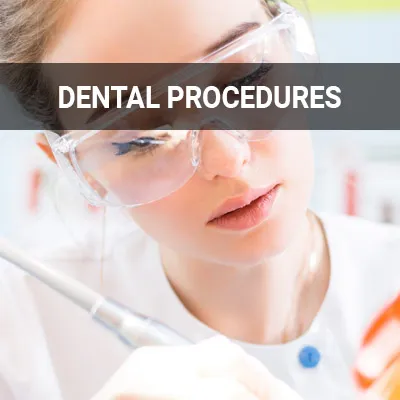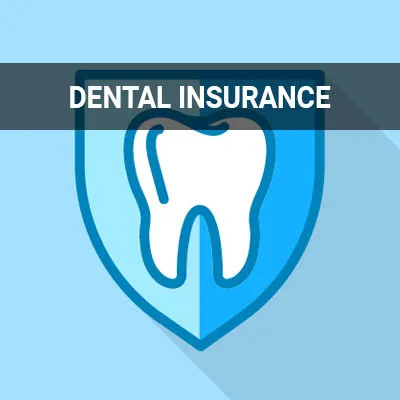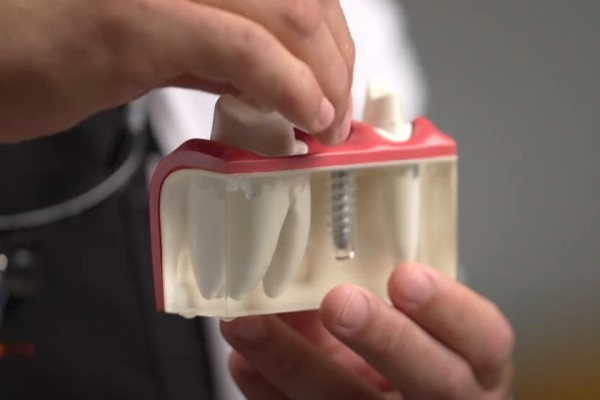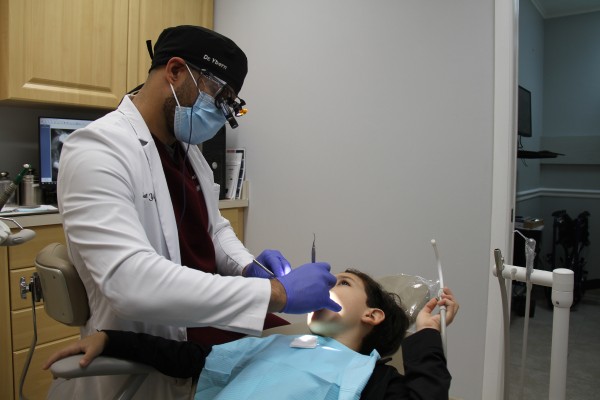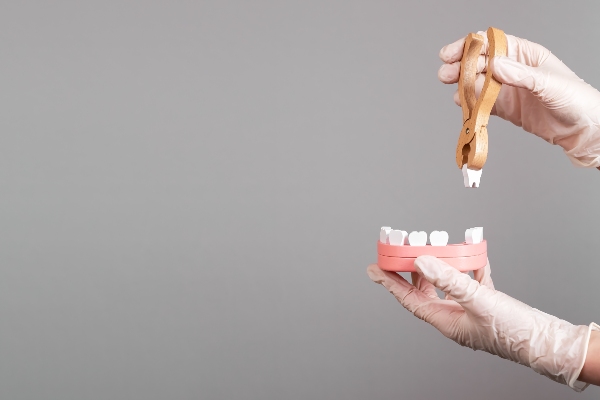TMJ Dentist Fort Pierce, FL
Temporomandibular joints, or TMJ, are responsible for opening and closing the mouth. TMJ dentist treatment can help patients find relief for jaw discomfort, soreness, and pain. The term refers to the jaw as well as nerves, muscles, and ligaments connected to it.
TMJ dentist treatment is available at Fort Pierce Smiles in Fort Pierce and the surrounding area. Our team of dental professionals performs a careful evaluation to understand what may be contributing to the patient's TMJ pain. To schedule a personal evaluation and get started with TMJ treatment, call (772) 232-7073 right away.
Causes of TMJ
The source of the problem with TMD is the jawbone at the temporomandibular joint. The temporal bones are in the front sides of the face, underneath the ears. These bones connect to the jaw. This pair of joints act as a hinge to allow the jawbone to open and close. In addition, several muscles support the joint that works to help the mouth function.
There are many possible reasons why patients suffer from TMD. Patients with arthritis, bruxism, high stress levels, poor posture, or misalignment of the bite may have TMD. Certain habits, like constant gum chewing, also sometimes lead to the disorder.
According to the National Institutes of Health, there may be as many as 10 million people suffering from TMD. In addition, patients with TMD may have problems with arthritis at the joint, jaw muscle pain, or misalignment. A TMJ dentist has the right knowledge and understanding to treat this disorder and relieve pain and alignment.
“There are many possible reasons why patients suffer from TMD.”
Temporomandibular Disorders (TMD)
Damage to the individual components of TMJ can lead to several serious problems. These include:
- Intense headaches
- Ear pain
- Chronic TMJ pain
- Tense facial muscles
- Inability to open or close the mouth
These conditions are known as temporomandibular disorders or TMD. Many people call them TMJ, though. A TMJ dentist understands how to alleviate joint pain symptoms using a combination of physical therapy, anti-inflammatory medications, and advanced treatment options.
“These conditions are known as temporomandibular disorders or TMD.”
Causes of TMD
Medical professionals are not entirely sure what causes TMD. According to the Mayo Clinic, pain may be due to a combination of physical and genetic factors. Certain conditions can increase your risk of developing TMJ problems or contribute to pain:
- Arthritis: Rheumatoid arthritis and osteoarthritis can damage cartilage and expose sensitive nerves in the jaw, leading to chronic pain and inflammation of surrounding tissues.
- Jaw injury: A sudden blow or fracture can hurt the TMJ and related bones, cartilage, or disks. Misaligned or damaged parts of this sensitive area can provoke severe pain almost immediately.
- Dislocation: A dislocated jaw can have long-term effects on the tendons, cartilage, and muscles in the affected area.
- Tooth alignment issues: Some people are born with severely misaligned teeth, which can add to the discomfort that joints deal with and cause improper wear.
- Chronic grinding or clenching of teeth: Constantly clenching teeth or grinding them increases the risk of developing TMD and makes it harder to treat inflammation.
- Stress: People under a lot of stress may develop TMJ pain and inflammation if they start to grind or clench the teeth.
“According to the Mayo Clinic, pain may be due to a combination of physical and genetic factors.”
Check out what others are saying about our dental services on Yelp: TMJ Dentist in Fort Pierce, FL
How a TMJ Dentist Can Help
There are many treatments to help with TMJ pain. Some reduce inflammation of sore tissues and strengthen the patient's jaw muscles. Other therapies promote relaxation and help to ease tense muscles and tendons.
Another way TMJ dentists provide relief is by correcting poor dental alignment. When teeth fit together correctly, TMJ muscles can work smoothly. This can also help to prevent clenching and grinding. Using special orthodontic appliances or mouth guards, it is often possible to reduce the effects of grinding the teeth at night.
“When teeth fit together properly, TMJ muscles can work smoothly.”
Questions Answered on This Page
Q. What is a temporomandibular disorder or TMD?
Q. How can a dentist help with TMJ?
Q. What are the causes of TMJ?
People Also Ask
Q. What other preventative services are available?
Q. What lifestyle choices help promote good oral health?
Q. What are the causes of sleep apnea?
Q. What should I know before beginning my search for a dentist?
Frequently Asked Questions
Q. How can I prevent TMJ?
A. There is no way to prevent this disorder completely, but some habits help relieve jaw stress and fatigue. TMJ dentist patients should pay special attention to their posture and practice better habits when working and sitting. Avoiding hard-to-chew foods, stretching regularly, and massaging the cheeks and jaws may help relieve jaw pain.
Q. How do I relieve TMJ symptoms at home?
A. Home remedies may not cure TMD, but some measures can help reduce the discomfort. For example, ice or heat may help with serious pain or swelling. Reducing stress and trying relaxation techniques may also help. For more at-home tips, see the TMJ dentist.
Q. Do weather changes make TMJ worse?
A. Some patients find that certain weather conditions make TMD pain worse. Winter weather, such as snow or ice, and the drier conditions in the air sometimes impact TMD pain levels. It is important to talk to the TMJ dentist for treatment options if the pain intensifies.
Q. Will the TMJ dentist recommend surgery?
A. While there are some surgical options for TMD pain, most patients get relief without invasive treatment. In some cases, the dentist may talk to the patient about surgery. Surgical options aim to correct physiological issues causing joint dysfunction.
Q. Can my primary care physician treat TMJ?
A. Patients with TMD pain may have more positive outcomes if they also see a TMJ dentist. A dental professional with experience treating TMD can often recommend effective treatment options for patients. The dentist partners with the patient's primary care physician to design the right treatment.
Dental Terminology
Call Us Today
Are you having trouble opening and closing your mouth or experiencing headaches? If you think you may have a TMJ disorder, call us at 772-232-7073 to schedule an evaluation right away.
Helpful Related Links
- American Dental Association (ADA). Glossary of Dental Clinical Terms. 2024
- American Academy of Cosmetic Dentistry® (AACD). Home Page. 2024
- WebMD. WebMD’s Oral Care Guide. 2024
About our business and website security
- Fort Pierce Smiles was established in 2023.
- We accept the following payment methods: American Express, Cash, Check, Discover, MasterCard, Visa, Care Credit, Sun Bit, iCreditWorks, and In house financing
- We serve patients from the following counties: St. Lucie County
- We serve patients from the following cities: Fort Pierce, Fort Pierce South, White City, Fort Pierce North, St Lucie, Okeechobee, Hutchinson Island, and Vero Beach
- Norton Safe Web. View Details
- Trend Micro Site Safety Center. View Details
Back to top of TMJ Dentist
